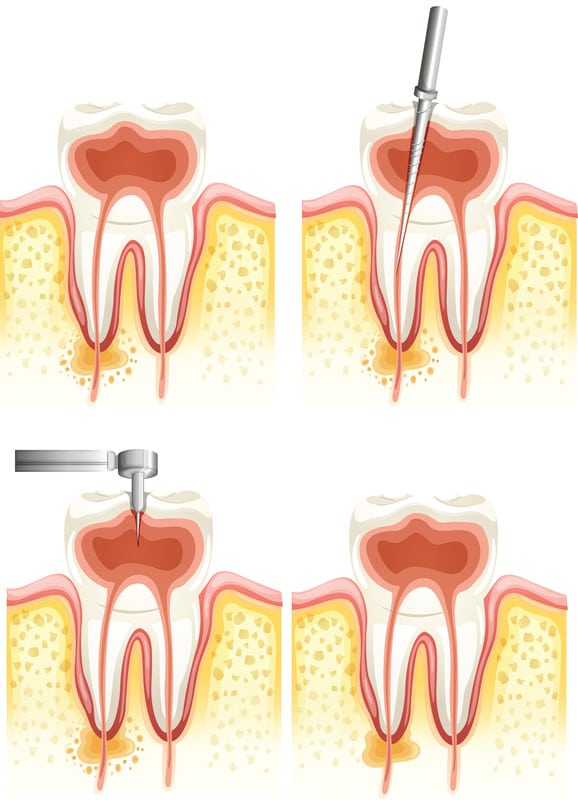At some point during your life, your dentist may suggest a root canal. While this is often considered a dreaded procedure, many people do not understand exactly what the procedure is, and what it entails.
It’s All About the Roots
Teeth have an interesting anatomy. Right under the enamel—the white part of the tooth we can see—and the dentin, there lies a pulp chamber. This pulp contains the nerves and blood vessels that help create and develop your teeth.
Leading down from the pulp chamber is the root canal. This connects the pulp chamber to the rest your gum tissue, and is the path that brings needed nutrients such as calcium to your teeth.
When you need a root canal procedure, also known as endodontic therapy (endo being Greek for “inside”, and odont being Greek for “tooth”) that means the pulp is inflamed or infected.
Typically this is caused by some kind of tooth injury, such as a chip or crack. This leads to the pulp being susceptible to bacterial infection, which can lead to painful abscesses—an inflammation which produces pus and, oftentimes, blood.
The Root Canal Procedure
The procedure itself is quite straightforward. As the tooth matures, the tooth starts relying on the tissue surrounding it for nourishment, so the pulp is not needed. The whole point of a root canal procedure is to remove the infected pulp from the chamber and the canal.
The first step is to administer a local anesthetic. This, along with covering the tooth with a dam—or covering to avoid saliva and bacteria from re-entering the tooth—your oral surgeon will create a hole at the top of your tooth.
Then, with extremely small instruments, the oral surgeon goes on to remove all the pulp from the pulp chamber and the canal leading down to the root.
Afterward, the entire empty cavity is filled with a rubber-like material called gutta-percha, which is resistant to infection. This material fills in the space and provides structure to the tooth, as well as ensuring the tooth and surrounding tissue do not develop further infection from bacteria.
A temporary filling will be installed before the final sealing of your tooth. It is extremely important to keep this area clean between visits, to ensure reinfection of the surrounding area does not occur.
Lastly, your oral surgeon will install a crown that seals off the tooth, usually in a separate visit. This finally covers the tooth in a protective barrier, further guarding it from infection.
Some considerations
Root canals, in short, are painful. Yet, because of the local anesthetic applied during the initial surgery, the pain is only felt afterward. Often, you will receive a prescription of ibuprofen, acetaminophen, or some other painkiller for both before and after the procedure.
You will also most likely receive an antibiotic, which helps to reduce the number of bacteria around the tooth. This is especially helpful for biting pain.
While it is important for you to use whatever treatments you are comfortable using, it is crucial to understand that pain in the tooth causes a reaction which can be harmful to the surgical process. Having an open and honest conversation about pain management with your oral surgeon is imperative to receiving the correct care, and ensuring a successful healing process.
Sometimes teeth are damaged to such a degree that using the gutta-percha and cement is not enough to ensure the structural integrity of the tooth post-operation. In this case, a post is inserted into your tooth to reinforce its structure, though this is not required in all cases. Your oral surgeon should let you know what will be necessary in this stage ahead of time.
Following Steps
One piece of advice all oral surgeons give to patients after undergoing an endodontic treatment is to avoid using the tooth for some time. In the post-operation state, the tooth could be susceptible to continuing fracture. Your post-operation regimen should include chewing on the opposite side of your mouth, staying away from carbonated, sugary, and acidic beverages, and avoiding external contact such as leaning on the side of the face with the tooth in question.
Keeping up with a robust dental hygiene regimen is also crucial after the procedure. This ensures the tooth can heal in a clean environment, integral to a successful healing process.
For any questions regarding a root canal procedure, it is highly advised to contact a professional. For any questions or concerns, give us a call at 02-6362-1987.


